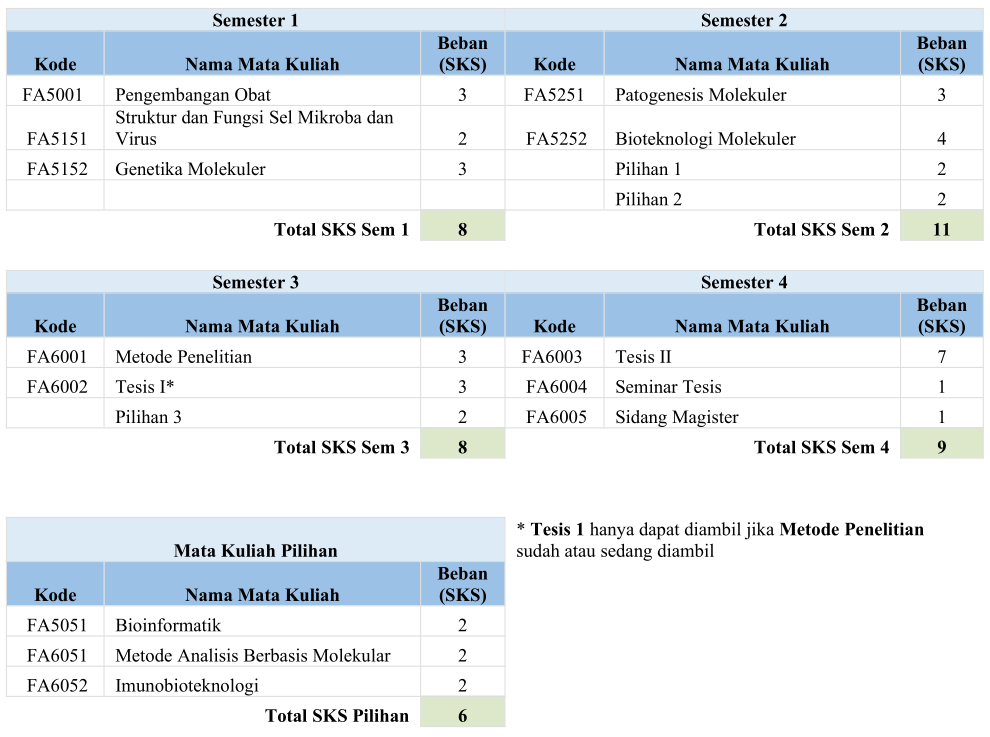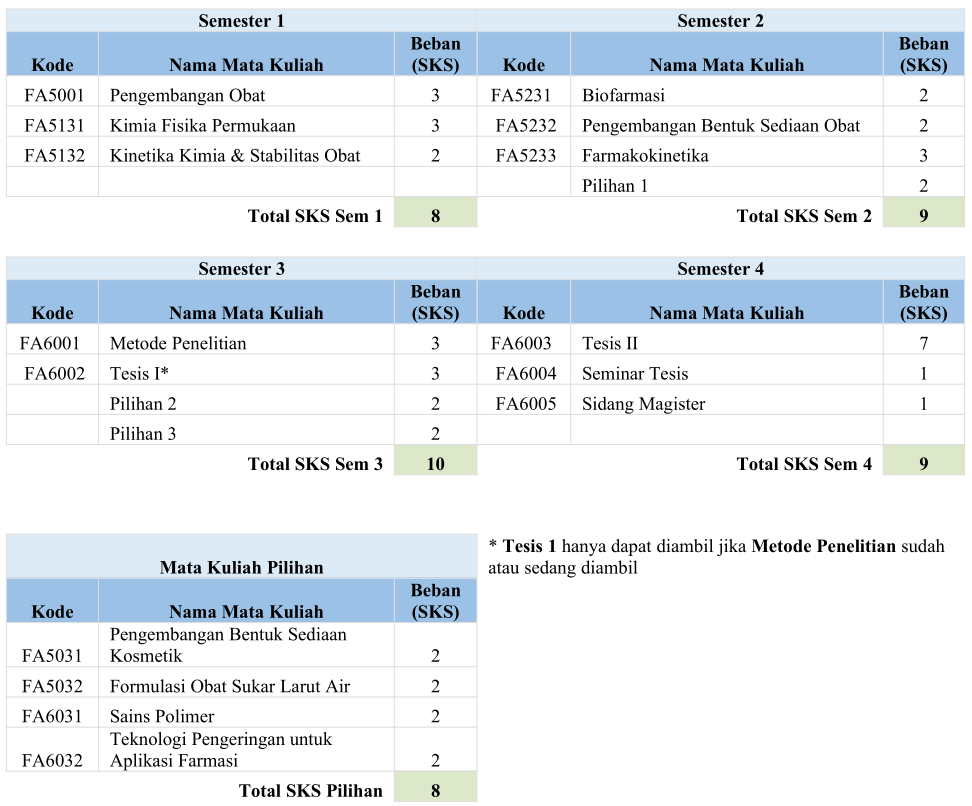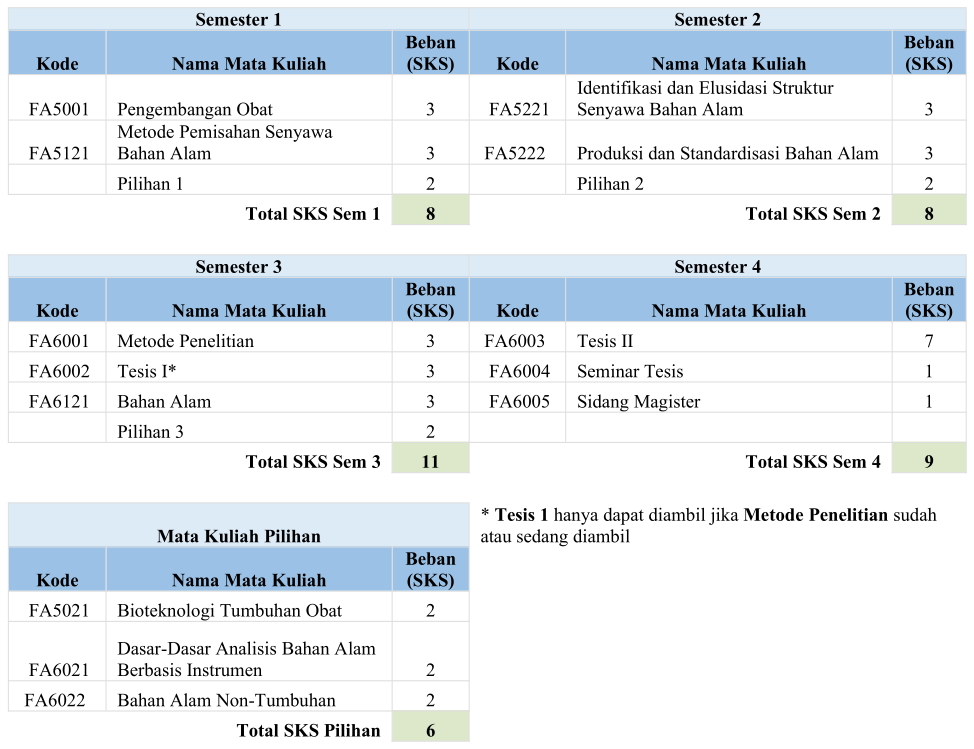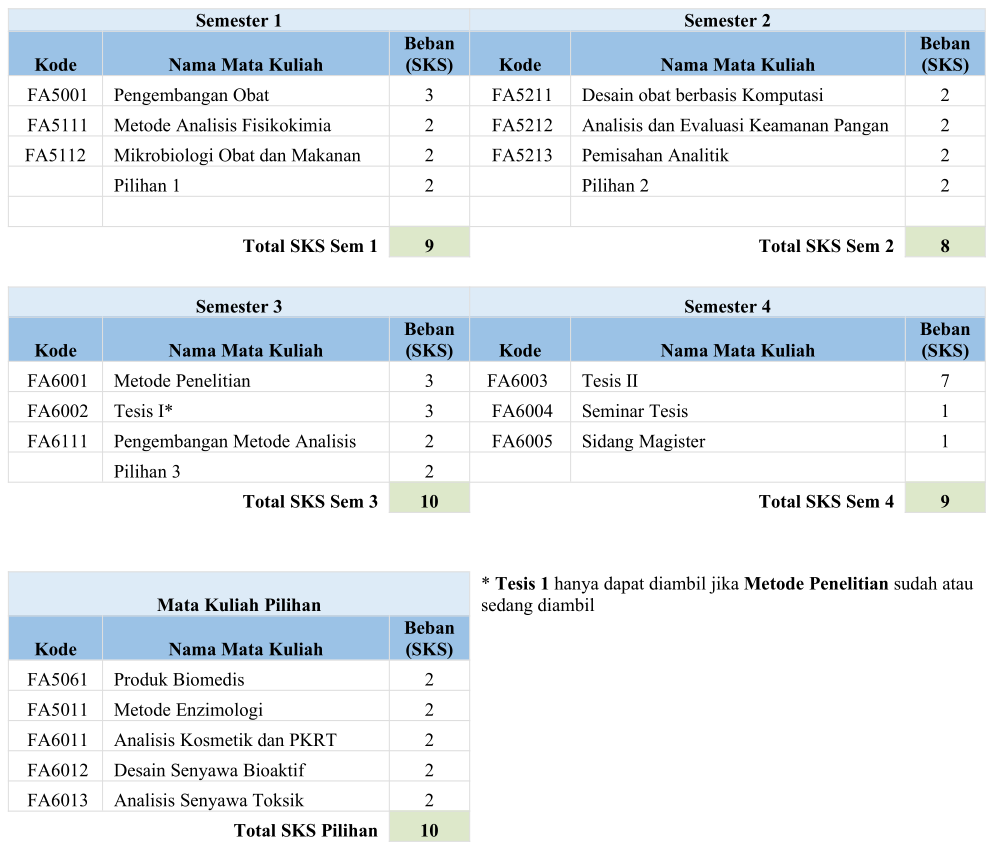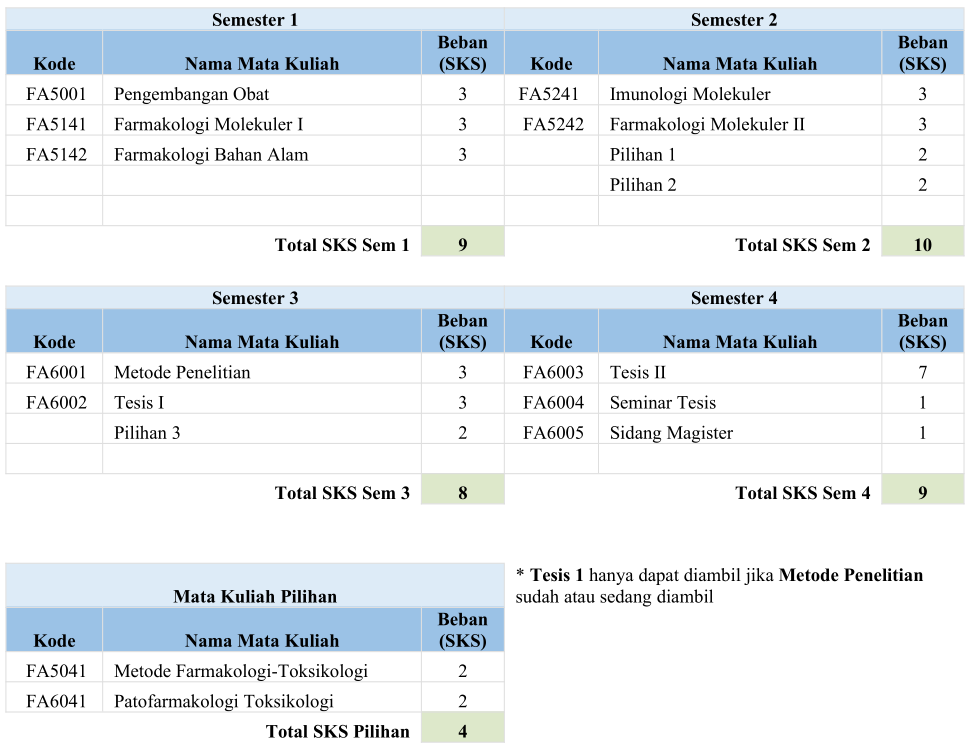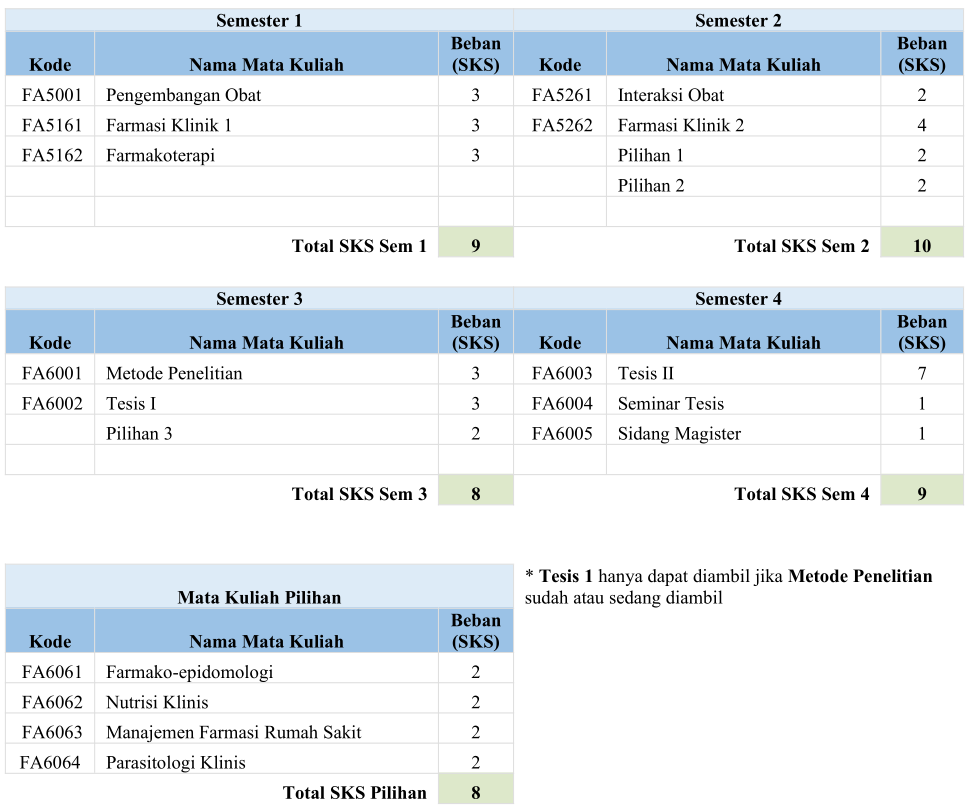Aktivitas pendidikan Magister Farmasi telah dimulai sejak tahun 1980, sedangkan Program Studi Magister Farmasi secara resmi diselenggarakan berlandaskan Surat Keputusan Dirjen Pendidikan Tinggi No. 589/Dikti/ Kep/1993 tertanggal 23 Oktober 1993. Sebagai kelanjutan dari jalur pendidikan tinggi di tingkat sarjana, pendidikan Magister terdiri dari pendidikan berorientasi akademik dan berorientasi terapan.
Program Magister Farmasi bertujuan untuk menghasilkan lulusan yang mahir dalam bidang ilmu pengetahuan dan/atau profesi kefarmasian, memiliki integritas tinggi, mampu mengembangkan ilmu pengetahuan dan kemahiran profesional secara mandiri dalam spektrum lebih luas, berkelanjutan serta menyadari akan hakekat keunggulan interdisciplinary ilmu pengetahuan dan mampu memberikan kemanfaatan keilmuan dan kemahirannya bagi masyarakat dan bangsa Indonesia.
Disamping program regular, Program Magister Sekolah Farmasi ITB juga melaksanakan program pendidikan yang diselenggarakan khusus melalui kerjasama dengan industri farmasi. Program ini dimaksudkan untuk memperkuat riset dan pengembangan industri farmasi di Indonesia. Produk-produk yang inovatif dan orisinil diharapkan muncul dari kegiatan ini sekaligus terjadi penguatan sumber daya riset industri.
Jalur Pilihan Dan Kompetensi Lulusannya
Opsi atau jalur pilihan Program Magister di Sekolah Farmasi ITB merupakan bagian dari Program Studi Magister Farmasi. Masing-masing jalur pilihan menetapkan kompetensi sesuai dengan fokus kemahiran spesifiknya. Namun demikian seluruh jalur pilihan menetapkan warna kefarmasian pada kompetensi lulusan, mengingat kemahiran lulusan ditargetkan bagi pengembangan ilmu kefarmasian di berbagai bidang ilmu lain yang relevan.
Jalur pilihan program Magister Sekolah Farmasi ITB adalah:
Jalur pilihan Farmakokimia
Meliputi Bidang Kimia Farmasi, Analisis & Keamanan Makanan, dan Kimia Medisinal.
Kompetensi Lulusan:
- Mampu merancang, menyusun dan melaksanakan pengembangan metode analisis untuk obat, kosmetik, makanan baik secara mandiri maupun berkelompok.
- Mampu mencari dan menggali informasi yang diperlukan untuk mengidentifikasi, menganalisis, menetapkan masalah dan solusinya atas persoalan yang dihadapi dalam bidang analisis kimia, fisikokimia dan mikrobiologi yang digunakan untuk obat, kosmetik dan makanan.
- Mampu berpartisipasi dalam standardisasi obat, makanan dan kosmetik.
- Mampu berpartisipasi dalam penemuan dan pengembangan senyawa kimia obat, makanan dan kosmetik.
Jalur pilihan Farmasetika
Meliputi bidang Teknologi Farmasi, Biofarmasi, Farmakokinetik dan Bioteknologi Farmasi.
Kompetensi Lulusan:
- Mampu merancang, menyusun, melaksanakan penelitian bidang farmasetika dan menganalisis hasilnya baik secara mandiri maupun berkelompok.
- Mampu mengidentifikasi permasalahan dalam formulasi, teknologi dan evaluasi mutu sediaan farmasi, termasuk aspek biofarmasi dan farmakokinetik (problem preventing) dan mampu menemukan solusi atas permasalahan tersebut (problem solving).
- Mampu mendesain dan melakukan standardisasi obat, sediaan farmasi lain untuk memenuhi standar mutu yang diharapkan.
Kompetensi untuk subopsi Bioteknologi Farmasi:
- Mampu mengidentifikasi permasalah dalam aspek produksi dan pengawasan mutu produk bioteknologi farmasi dan mampu menemukan solusi atas permasalahan tersebut.
- Mampu merancang, menyusun dan melaksanakan penelitian serta mengevaluasi hasil penelitian di bidang bioteknologi farmasi.
- Mampu mengikuti, mengkaji dan menilai perkembangan bioteknologi dengan pendekatan molekuler dalam berbagai bidang Farmasi (produk terapi, vaksin dan diagnostik).
Jalur pilihan Farmasi Bahan Alam
Kompetensi Lulusan:
- Mampu mengembangkan metode analisis senyawa aktif asal alam baik dalam bentuk tunggal (metabolit) maupun golongan senyawa.
- Mampu mengembangkan teknik ekstraksi dan isolasi bahan-bahan alam.
- Mampu mengembangkan metode standardisasi bahan baku dan sediaan obat dari alam.
- Mampu mengembangkan metode untuk mengontrol peningkatan produksi senyawa metabolit sekunder menggunakan teknik kultur jaringan dan teknik bioTeknologi tumbuhan lainnya.
- Mampu berkontribusi dalam mengembangkan metode penemuan varietas unggul bibit tanaman obat di samping metode identifikasi tanaman berpotensi lain seperti pupuk atau pestisida/fungisida alami.
- Mampu berpartisipasi dalam pengembangan obat dari bahan alam.
Jalur pilihan Farmakologi-Toksikologi
Kompetensi Lulusan:
- Mampu mengkaji dan mengevaluasi aktivitas, khasiat, efek samping, efek toksik dan interaksi obat alam/sintetik dengan zat lain dan dengan lingkungan.
- Mampu mengembangkan bidang farmakologi-toksikologi, mengembangkan metode baru dalam uji farmakologi.
- Mampu menerapkan data farmakologi-toksikologi eksperimental ke dalam aspek praktek klinis.
- Mampu berpartisipasi aktif dalam kegiatan standardisasi dan kebijakan bidang obat/kesehatan.
- Mampu memilih dan memberikan informasi obat serta produk kesehatan lainnya.
Jalur pilihan Farmasi Klinis
Kompetensi Lulusan:
- Mampu mengkaji dan mengevaluasi aktivitas, khasiat, efek samping, efek toksik dan interaksi obat alam/sintetik dengan zat lain dan dengan lingkungan yang berkaitan dengan klinis di komuniti farmasi.
- Mampu mengembangkan bidang pelayanan kefarmasian ke pasien, mengembangkan metode pelayanan Farmasi klinis.
- Mampu menerapkan data farmakologi-toksikologi eksperimental ke dalam aspek praktek klinis.
- Mampu berpartisipasi aktif dalam kegiatan standardisasi dan kebijakan bidang obat/kesehatan
- Mampu memilih dan memberikan informasi obat serta produk kesehatan lainnya.
Persyaratan bidang keahlian calon peserta untuk masing jalur pilihan adalah sebagai berikut:
| JALUR PILIHAN | SYARAT |
| Farmakokimia | Sarjana Farmasi, Kimia, Teknik Kimia, Teknologi Pangan |
| Farmasetika | Sarjana Farmasi, Apoteker |
| Bioteknologi Farmasi | Sarjana Farmasi, Biologi, Kimia, Kedokteran |
| Farmasi Bahan Alam | Sarjana Farmasi, Kimia, Biologi, Pertanian |
| Farmakologi-Toksikologi | Sarjana Farmasi, Kedokteran, Kedokteran Hewan, Biologi |
| Farmasi Klinis | Apoteker, Sarjana Farmasi |
